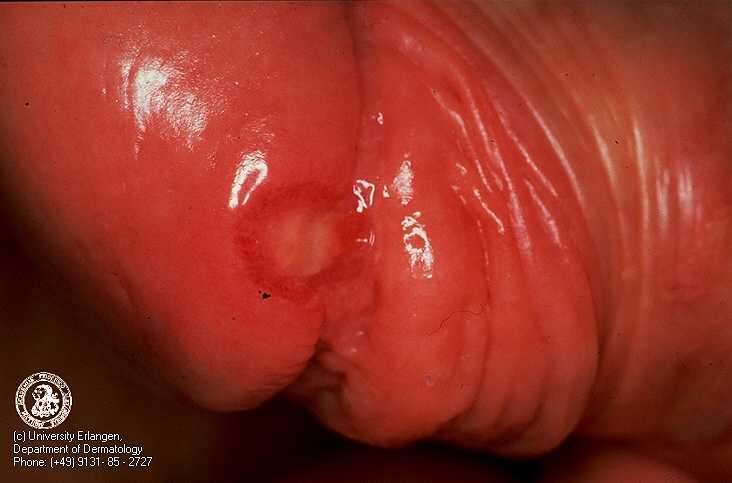

This web page was produced as an assignment for an undergraduate course at Davidson College.
Stages of Syphilis
Syphilis is often called "the great imitator" because it has varying symptoms and these symptoms usually resemble those of many other diseases. The bacteria usually follows a four stage pattern that at times can overlap.
Primary Syphilis (Stage One)
The first symptom of syphilis is a small, round firm ulcer known as a chancre that usually develops at the site of infection where the bacteria has entered the body.
Nearby Lymph Glands are often swollen due to the immunological response towards infection.
Chancres will often appear about three weeks after infection but can present themselves within 9 to 90 days after initial exposure to the bacteria. During this primary stage of syphilis, the infected person is highly contagious. Chancres are usually painless and can occur inside the body which often leaves these chancres to go undetected or unnoticed. The chancres will disappear in about three to six weeks even without the treatment of the bacteria or infection. If the infection is not treated however, then it is enevitable that the infection will progress to secondary stage.


Secondary Syphilis (Stage Two)
The secondary stage of syphilis brings about a non-itchy skin rash that appears in the infected area of the body as well as more commonly found on the palms, hands, and soles of the feet. However, the skin rash could in fact cover the entire body or in a few areas. The rash appears two to ten weeks after the chancre developed and disappeared. The rash will appear generally where the chancre is healing or already healed. The rash contains reddish brown, small, solid, flat or raised skin sores that are only a couple of centimeters in length. One problem is that the syphilis rash can take on the form and look of many other common skin problems. Small, open sores can develop on the mucous membranes and may contain pus or moist sores that are wart-like.
Some common syptoms with secondary syphilis are sore throat, fatigue, weakness or discomfort of the body, swollen lymph glands, weight loss and patchy hair loss. Some less frequent symptoms that can occur are fever, aches, severe weight loss, aching joints, or lessions in/around the mouth and genital region. Nervous system symptoms of secondary syphilis include headaches, irritability, paralysis, unequal reflexes, and irregular sized pupils. After infection, skin discoloration will occur where the rash and sores were spotted.
This stage of syphilis is highly contagious as well. Secondary syphilis will too disappear without treatment during a period of two to twelve weeks. This does not mean that the syphilis bacteria has been irradicated. Without treatment the bacteria will go on to the next stage of syphilis. There may be recurrences of secondary syphilis for a one to two year period.



Latent Syphilis (Stage Three)
Latent syphilis is known as the "hidden" stage of syphilis.
This usually is marked by completeing an entire year of infection. After the secondary syphilis rash disappears the infected will undergo a latent stage. This is where one will experience no symptoms at all yet the bacteria is still inside the body. The latent period can be brief and last up to a year or can be long and drawn out and last anywhere from five to twenty years. Because no symptoms are present, accurate diagnosis can only be made through blood tests. One is only contagious in the earlier part of the latent stage. This however is misleading because you can still infect your partner through sexual contact.
If you do not get treatment during the latent stage you will develop the next stage of infection which is the most serious stage of the disease.
Tertiary Syphilis (Stage Four)
This is the most destructive and devestating stage of the disease. Only a small percentage of those infected who do not undergo treatment will develop the terrible complications that accompany tertiary (or late) syphilis. If untreated, Tertiary syphilis can develop from as early as one year after infection to decades into the disease.
Tertiary syphilis causes damage to the heart, eyes, brain, nervous system, bones, joints, and many other areas of the body. This late stage can result in mental illness, blindness, deafness, memory loss, heart disease, neurological issues, and even death. One serious development during this stage would that be of neurosyphilis which causes extreme brain and spinal chord damage.

http://www.bium.univ-paris5.fr/sfhd/img/gd/image12g.jpg.
Return to My Home Page
Any questions, comments, or concerns please email at stdouglass@davidson.edu